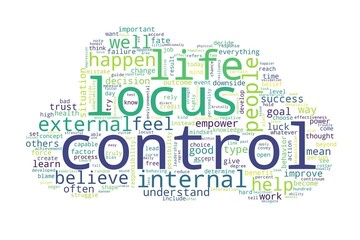
Psychological Concept
Locus of control is a psychological concept that refers to the extent to which individuals believe they have control over the events that affect their lives. It is a personality trait that describes the degree to which people believe that their own actions and choices can influence their outcomes. Locus of control has been widely studied in psychology, and it has been found to have a significant impact on many areas of life, including mental health, academic achievement, and job performance.
Julian Rotter in 1950s
The concept of locus of control was first introduced by psychologist Julian Rotter in the 1950s. He proposed that people’s behavior is influenced by their perception of control, and that this perception can be either internal or external. Individuals with an internal locus of control believe that they are in control of their lives, while those with an external locus of control believe that outside forces such as luck, fate, or other people are responsible for their outcomes.
Internal Locus of Control
People with an internal locus of control tend to be more confident, motivated, and achievement-oriented. They believe that their own actions and decisions are the primary determinants of their outcomes, and they take responsibility for their successes and failures. They are more likely to take risks, persist in the face of obstacles, and seek out opportunities for personal growth and development.
External Locus of Control
On the other hand, individuals with an external locus of control tend to feel helpless, powerless, and dependent on others. They believe that their outcomes are largely determined by factors outside their control, and they often attribute their successes and failures to luck or chance. They may be less motivated to pursue their goals and more likely to give up when faced with challenges.
Locus of Control Affects our Mental Health
Locus of control can have important implications for mental health. Research has shown that individuals with an internal locus of control are more resilient to stress and better able to cope with adversity than those with an external locus of control. They are also less likely to experience anxiety, depression, and other mental health problems. In contrast, people with an external locus of control may be more prone to negative emotions, feelings of helplessness, and a sense of hopelessness.
Locus of Control affects multiple areas of our life
In addition to its impact on mental health, locus of control can also affect academic achievement and job performance. Students with an internal locus of control are more likely to set goals, develop effective study habits, and perform better academically than those with an external locus of control. Similarly, employees with an internal locus of control tend to be more motivated, productive, and satisfied with their jobs than those with an external locus of control.
Nature Vs Nurture or Personality vs Environment
While locus of control is largely a personality trait, it can also be influenced by environmental factors. For example, parents, teachers, and other authority figures can influence children’s locus of control by the way they reward or punish behavior. In addition, life experiences, such as successes and failures, can also shape individuals’ beliefs about control.
We Have control over events in our lives
Locus of control is an important psychological concept that describes the degree to which people believe they have control over the events that affect their lives. Individuals with an internal locus of control tend to be more confident, motivated, and achievement-oriented, while those with an external locus of control may feel helpless and powerless. Locus of control can have significant implications for mental health, academic achievement, and job performance, and it can be influenced by a variety of environmental factors.

